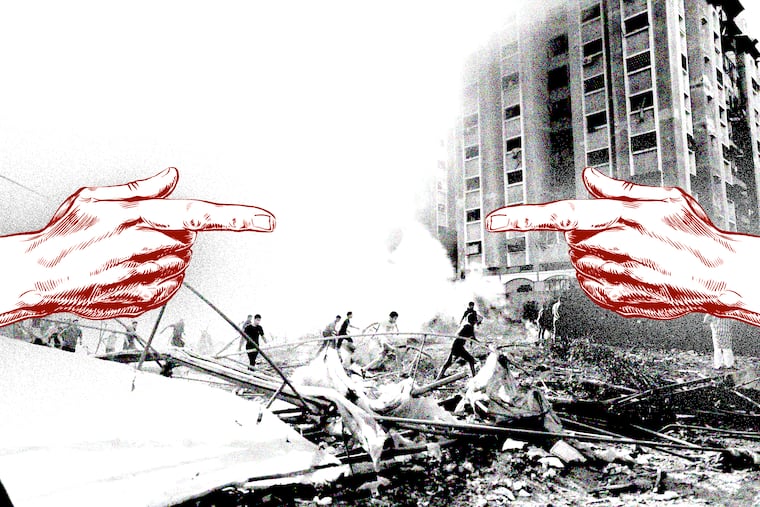In war between Israel and Hamas, explaining evil doesn’t excuse it
You can't excuse killing civilians by saying someone else "made you do it." We should be asking about the roots of the horror while also holding the perpetrators responsible for it.

There’s a well-known French proverb that has been pinging through my brain for the past few days: Tout comprendre c’est tout pardonner. In English, that means “to understand all is to forgive all.”
But that’s not true, of course. You can provide any number of explanations for a behavior without excusing it.
Alas, that’s a lesson a lot of us seem to have forgotten in the wake of the Hamas attack on Israel.
On the left, especially, some critics insist that the oppression of Palestinians justifies the murder of Israeli civilians. On the right, meanwhile, other people fear that any effort to explain the Hamas attack — to point out the historical and recent events that prompted it — will somehow excuse it. Still others claim that the horrific attack will justify any retaliation by Israel, even if it kills hundreds of innocent civilians.
They’re all wrong.
At a moment like this one, we should be asking about the roots of the horror while also holding the perpetrators responsible for it. Anything less is dehumanizing, because it denies the perpetrators’ status as full moral actors, all in the guise of defending them.
At a moment like this one, we should be asking about the roots of the horror while also holding the perpetrators responsible for it.
Consider student protesters at George Mason University, who donned face masks, kaffiyehs, and sunglasses for its pro-Palestinian “Day of Resistance” rally last Thursday. “They got tanks, we got hang gliders,” the students chanted. “Glory to the resistance fighters.”
Students at California State University, Long Beach advertised their pro-Palestinian rally with posters of paragliders, which Hamas terrorists used to launch their attack. And around the country, protesters insisted that the Hamas attack was just — and the victims got what they deserved.
“We ... hold the Israeli regime entirely responsible for all unfolding violence,” read a statement signed by dozens of student groups at Harvard. “The apartheid regime is the only one to blame.”
If you absolve people of human responsibility, you render them less than human. Despite their cries for a “free Palestine,” these groups don’t actually believe in the free will of the people they champion. “Israel made them do it” means the terrorists lacked control over their own actions. What could be more disparaging than that?
Meanwhile, some allies of Israel insisted that it was wrong to think about the causes of the initial attack by Hamas, which would somehow exonerate the attackers. “You take the politics and the history and the religion out of this struggle and this is a war that’s easy to take sides on,” Fox News host Jesse Watters said last week. “This is a war between humanity and pure evil.”
But we can’t — and we shouldn’t — ignore politics, religion, and history. They’re precisely what brought us to this awful moment. Surely we can denounce evil actions without reducing the complicated Mideast conflict to a simple morality play.
» READ MORE: As a Jew, I understand that the root of violence in Gaza is oppression | Opinion
About 1.7 million of Gaza’s 2.1 million residents are — or descended from — Palestinians who were forced to leave their homes in 1948, when Israel was born. Again, that doesn’t excuse what Hamas did. But you can’t understand the present-day crisis if you turn a blind eye to the Palestinian past.
Think about our own crisis in America surrounding gun violence. Each day, an average of 39 people are murdered by guns and 95 are injured in a gun attack.
To explain these numbers, you can’t just look at what happened the day of the shooting. You need to look back and consider our long-standing inequities in housing, education, health, and more. Any real solution to the problem of gun violence will require us to provide more opportunities and services to people caught up in cycles of poverty, fear, and retribution. But we still need to hold shooters accountable, as full moral beings.
We can’t — and we shouldn’t — ignore politics, religion, and history.
Likewise, if Israel retaliates by killing thousands of innocent Palestinian civilians, we shouldn’t imagine that “anything that happens in Gaza is the responsibility of Hamas,” as Sen. Tom Cotton (R., Ark.) tweeted last weekend. That’s as absurd as the Harvard students blaming Israel for the Hamas attack. That attack will help explain the mounting civilian deaths in Gaza, but it cannot — and will not — excuse them.
In a famous 1971 experiment, Stanford psychologist Philip Zimbardo randomly assigned students into groups of prisoners and guards in a mock jail. Planned to last two weeks, the experiment had to be abandoned on its sixth day because the guards were being so cruel to the prisoners.
Zimbardo’s point? Anyone could act in brutal and sadistic ways if their environment promoted brutality and sadism. But he insisted that all of us remained culpable for our actions, no matter what conditions we had suffered before.
“I repeat the mantra that attempting to understand the situational and systemic contributions to any individual’s behavior does not excuse the person or absolve him or her from responsibility in engaging in immoral, illegal, or evil deeds,” Zimbardo wrote in his book, The Lucifer Effect.
That should be the mantra for all of us, right now. We must continue our quest to understand why human beings engage in horrific behavior. But we must never, ever excuse it. That’s the only way to hold on to our humanity, in a world that seems to deny it every day.